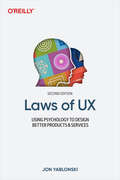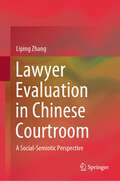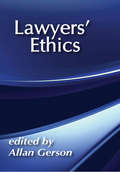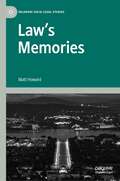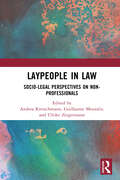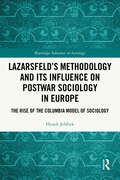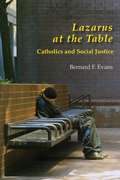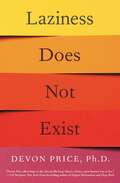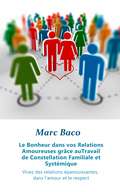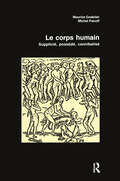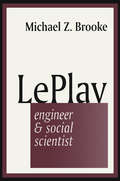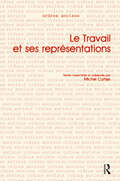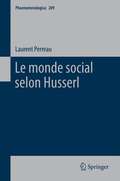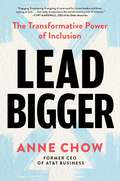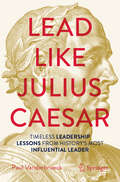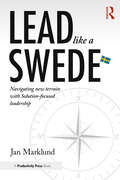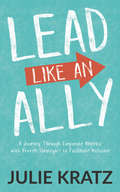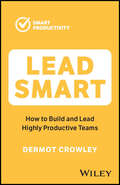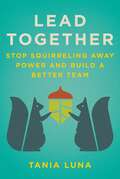- Table View
- List View
Lawful Order: A Case Study of Correctional Crisis and Reform (Current Issues in Criminal Justice #Vol. 23)
by Leo CarrollFirst published in 1999. Routledge is an imprint of Taylor & Francis, an informa company.
Laws of UX: Using Psychology to Design Better Products & Services
by Jon YablonskiAn understanding of psychology-specifically the psychology behind how users behave and interact with digital interfaces-is perhaps the single most valuable nondesign skill a designer can have. The most elegant design can fail if it forces users to conform to the design instead of working within the "blueprint" of how humans perceive and process the world around them.This practical guide explains how you can apply key principles of psychology to build products and experiences that are more human-centered and intuitive. Author Jon Yablonski deconstructs familiar apps and experiences to provide clear examples of how UX designers can build interfaces that adapt to how users perceive and process digital interfaces.You'll learn:How aesthetically pleasing design creates positive responsesThe principles of psychology most useful for designersHow these psychology principles relate to UX heuristicsPredictive models including Fitts's law, Jakob's law, and Hick's lawEthical implications of using psychology in designA practical framework for applying principles of psychology in your design processThis updated edition includes an even deeper connection to the underlying psychological concepts that govern the principles explored in the book, along with accompanying UX methods and techniques. Examples have been updated to ensure the deconstructed apps and experiences remain familiar and relevant.
Lawyer Evaluation in Chinese Courtroom: A Social-Semiotic Perspective
by Liping ZhangThis book focuses on the speech style of lawyer talk in contemporary Chinese courtrooms. The topic is intriguing to readers who may wonder how lawyers compete with their opposing counterparts in an adversarial trial system in China. The legal tradition in Confucianism, which advocates harmony in interpersonal relationships, has historically guided the practice of law in China. The book analyses how lawyers manage to compete in this system. Applying the social semiotic view of language in the Hallidayian sense, specifically systemic functional linguistics and its appraisal theory, this study interprets the subjectivity of legal language by lawyers. The speech style in legal argument presentation is described as 'rational'. The exploration of the rational speech style of lawyers is a theoretical and discursive topic. It draws upon Habermasian philosophy of intersubjectivity in legal argumentation and considers the cultural and legal contexts of China as contextual constraints. The keyconstruct of lawyer evaluation is fully captured in this discussion. As a linguistic phenomenon and unit of analysis, discourse can be examined both within local clauses and in larger stretches of talk beyond clauses. Additionally, it serves as an effective means for constructing a rational speech style for lawyers. Most importantly, discourse is a discursive act that negotiates legal arguments in the dynamic speech exchanges of a court trial, which is embedded in a wider social and cultural context. The book showcases instances of lawyer talk in well-documented trials in China and offers a good opportunity for readers to gain a general understanding of courtroom discourse in the Chinese context. It introduces readers with special interests in legal language and the law to the solidarity dimension of legal language and arguments, an alternative to the confrontational or hostile lawyer talk in trials in countries with a common-law system. The analysis presented is refined and the language used is clear, concise, and objective.
Lawyers and Mediation
by Bryan ClarkThis book charts the historical and current interaction between lawyers and mediation in both the common law and civil law world and analyses a number of issues relevant to lawyers' part in the process. Lawyers have in the past and continue to play many roles in the context of mediation. While some are champions for the process, many remain on the fringes and apathetic, while others are openly sceptical or even anti-mediation in their stance. Yet others may have embraced mediation but, it is argued, for cynical, disingenuous reasons. By reviewing existing empirical evidence on lawyers' interactions with mediation and by examining historical and current trends in lawyers' dalliance with mediation, this book seeks to shed new light on a number of related issues, including: lawyers' resistance to mediation; lawyers' motives for involvement with mediation; the appropriateness of lawyers acting as mediators and party representatives; and the impact that both lawyers and the increasing institutionalisation of mediation have had on the normative form of the process, as well as the impact that mediation experience heralds for lawyers and legal systems in general.
Lawyers' Ethics
by Allan GersonFrequently the ethical attorney finds himself in a position where he can no longer reconcile con-flicting responsibilities he owes to his clients with those he owes so-ciety and himself. Faced with the dilemma of choice among coun-tervailing and competing obliga-tions, he has little training and precedence to guide him. If he is over forty, the overwhelming probability is that he never took a course on legal ethics; if he looks for a general, up-to-date text to provide insight, he will look in vain. Nor is there a developed body of case law from which to glean an appropriate course of action.This vacuum of authoritative formulations of responsible be-havior is a matter of concern not only to the legal profession, but to all sectors of American society. Lawyers shape the mores and thoughts of all of us. Their will is exerted not only in modifying our national institutions, but ulti-mately our individual, personal sense of values.This volume serves two impor-tant purposes: it provides the interested professional and lay reader with an appreciation of thespectrum of the ethical dilemmas confronting the legal profession, and it provides a sense of balance about the competing consid-erations present in each of these dilemmas. At a time when the legal profession is under attack both from within and without, this book represents some of the best critical thinking by lawyers about their role and responsibilities in American society.
Law’s Memories (Palgrave Socio-Legal Studies)
by Matt HowardThis book discusses the relationship between law and memory and explores the ways in which memory can be thought of as contributing to legal socialization and legal meaning-making. Against a backdrop of critical legal pluralism which examines the distributedness of law(s), this book introduces the notion of mnemonic legality. It emphasises memory as a resource of law rather than an object of law, on the basis of how it substantiates senses of belonging and comes to frame inclusions and exclusions from a national community on the basis of linear-trajectory and growth narratives of nationhood. Overall, it explores the sensorial and affective foundations of law, implicating memory and perceptions of belonging within this process of creating legality and legitimacy. By identifying how memory comes to shape and inform notions of law, it contributes to legal consciousness research and to important questions informing much socio-legal research.
Laypeople in Law: Socio-Legal Perspectives on Non-Professionals
by Guillaume Mouralis Ulrike Zeigermann Andrea KretschmannThis book contributes to a better understanding of the role laypeople hold in the social functioning of law.It adopts the scholarly insight that the law is unthinkable without an everyday legal understanding of the law pursued by laypeople. It engages with the assumption that not only the law’s existence but also its development is shaped by the layperson’s affirmations, oppositions, ignorance, or negations of the law. This volume thus aims to fill a void in socio-legal studies. Whereas many sociolegal theories tend to conceptualize the law through legal experts’ actions, institutions, procedures, and codifications, it argues that such a viewpoint underestimates the role of laypeople in the law’s processing and advocates for a strengthened conceptual place in socio-legal theory.This book will appeal to socio-legal scholars and sociologists (of law), as well as to legal practitioners and laypersons themselves.
Lazarsfeld’s Methodology and Its Influence on Postwar Sociology in Europe: The Rise of the Columbia Model of Sociology (Routledge Advances in Sociology)
by Hynek JeřábekThis book explains how the Columbia model of sociology, which was based on the methodology of P.F. Lazarsfeld, became a dominant sociological school of thought in American and European postwar sociology.Providing an overview of Lazarsfeld’s inventions and his methodological, organisational, and institutional innovations, it describes the means by which a particular model of sociology was gradually adopted in departments headed by Lazarsfeld and in the work of his successors. With attention to the use by Lazarsfeld of methodological texts published by prestigious publishing houses in his research and teaching, his activity in international organisations – including the UN – his collaboration with figures such as Robert K. Merton and Raymond Boudon, and his attempts to show how the roots of his empirical research methodology lay in the work of early European scholars, this volume shows how a particular sociological paradigm came to prevail over others for more than a decade.It will therefore appeal to scholars of sociology with interests in the history of the discipline and questions of research methodology.
Lazarus At The Table: Catholic And Social Justice
by Bernard F. Evans"Lazarus at the Table" is the fruit of more than two decades of instructing students in the social teachings of the Catholic Church. For most of these years Bernard Evans has taught graduate students. Lately he also teaches lay Catholics engaged in parish ministry and enrolled in diocesan ministry formation programs. This book is written specifically for the latter group. <P> Evans agrees with the bishops of the United States who insist that any Catholic education that does not include Catholic social teaching is not fully Catholic. And so he writes clearly, concisely, and convincingly about how Catholic social teaching addresses such contemporary issues as human dignity, abortion, assisted suicide and euthanasia, embryonic stem cell research, the death penalty, war, family, marriage, poverty, superfluous income, just wages, unions, peace, solidarity, and many more. Excerpts from the church's official teachings in papal documents abound throughout the book. "Bernard Evans holds the Virgil Michel Ecumenical Chair in Rural Social Ministries at Saint John's School of Theology'seminary, Collegeville, Minnesota. "
Laziness Does Not Exist
by Devon Price Ph.D.From social psychologist Dr. Devon Price, a fascinating and thorough examination of what they call the &“laziness lie&”—which falsely tells us we are not working or learning hard enough—filled with practical and accessible advice for overcoming society&’s pressure to &“do more.&” Extra-curricular activities. Honors classes. 60-hour work weeks. Side hustles. Like many Americans, Dr. Devon Price believed that productivity was the best way to measure self-worth. Price was an overachiever from the start, graduating from both college and graduate school early, but that success came at a cost. After Price was diagnosed with a severe case of anemia and heart complications from overexertion, they were forced to examine the darker side of all this productivity. Laziness Does Not Exist explores the psychological underpinnings of the &“laziness lie,&” including its origins from the Puritans and how it has continued to proliferate as digital work tools have blurred the boundaries between work and life. Using in-depth research, Price explains that people today do far more work than nearly any other humans in history yet most of us often still feel we are not doing enough. Dr. Price offers science-based reassurances that productivity does not determine a person&’s worth and suggests that the solution to problems of overwork and stress lie in resisting the pressure to do more and instead learn to embrace doing enough. Featuring interviews with researchers, consultants, and experiences from real people drowning in too much work, Laziness Does Not Exist encourages us to let go of guilt and become more attuned to our own limitations and needs and resist the pressure to meet outdated societal expectations.
Le Bonheur dans vos Relations Amoureuses grâce au Travail de Constellation Familiale et Systémique: Vivez des relations épanouissantes, dans l’amour et le respect
by Marc BacoLe Bonheur dans vos Relations Amoureuses grâce au Travail de Constellation Familiale et Systémique de Marc Baco Le Bonheur dans vos Relations Amoureuses grâce au Travail de Constellation Familiale et Systémique : vivez des relations épanouissantes, dans l’amour et le respect Ce livre vous apprendra : Comment vous libérer pour réussir à developer une relation épanouissante Comment dépasser les intrications, les schémas établis et les blocages dans votre couple Comment activer vos ressources Comment grandir ensemble dans une relation grâce aux constellations familiales Comment créer un lien profond, dans le respect Comment nourrir votre âme d’amour Ce livre s’adresse à tous ceux qui souhaitent avoir une relation de couple heureuse. Il s’adresse aux clients et aux facilitateurs de constellations familiales. Bien qu’il ne remplace pas une participation active à une constellation familiale et systémique, il aide à vous y préparer. Les exemples de constellations mentionnés dans ce livre incluent des exercices à faire chez soi. Apprenez de ceux qui ont réussi à enrichir leur couple, grandir et s’épanouir grâce aux constellations familales et systémiques. Le Bonheur dans vos Relations Amoureuses grâce au Travail de Constellation Familiale et Systémique de Marc Baco Le Bonheur dans vos Relations Amoureuses grâce au Travail de Constellation Familiale et Systémique : vivez des relations épanouissantes, dans l’amour et le respect Ce livre vous apprendra : Comment vous libérer pour réussir à developer une relation épanouissante Comment dépasser les intrications, les schémas établis et les blocages dans votre couple Comment activer vos ressources Comment grandir ensemble dans une relation grâce aux constellations familiales Comment créer un lien profond, dans le respect Comment nourrir
Le Boogie Woogie: Inside an After-Hours Club (The Cosmopolitan Life)
by Terry WilliamsThe “after-hours club” is a fixture of the African American ghetto. It is a semisecret, unlicensed “spot” where “regulars” and “tourists” mingle with “hustlers” to buy and use drugs long after regular bars are closed and the party has ended for the “squares.” After-hours clubs are found in most cities, but for people outside of their particular milieu, they are formidably difficult to identify and even more difficult to access.The sociologist Terry Williams returns to the cocaine culture of Harlem in the 1980s and ’90s with an ethnographic account of a club he calls Le Boogie Woogie. He explores the life of a cast of characters that includes regulars and bar workers, dealers and hustlers, following social interaction around the club’s active bar, with its colorful staff and owner and the “sniffers” who patronize it. In so doing, Williams delves into the world of after-hours clubs, exploring their longstanding function in the African American community as neighborhood institutions and places of autonomy for people whom mainstream society grants few spaces of freedom. He contrasts Le Boogie Woogie, which he visited in the 1990s, with a Lower East Side club, dubbed Murphy’s Bar, twenty years later to show how “cool” remains essential to those outside the margins of society even as what it means to be “cool” changes. Le Boogie Woogie is an exceptional ethnographic portrait of an underground culture and its place within a changing city.
Le Corps Humain
by Maurice Godelier Michel PanoffPourquoi mourir? Comment survivre? De la naissance a la mort, c'est par le corps, c'est dans l'habitacle du corps que l'homme se situe dand l'unvers et fair l'expereince de ses congeneres. A l'occasion des rite de passage notamemnt, c'est par le coprps que la societe revendique l'individu comme sien, at c'est sure son corps qu'elle inscrit cette appartenance. Mais nulle branche de la famille humaine ne s'est jamais resignee aux limites naturelles que le corps assignait aux experiences vecues ou aux transformations subies par sa matiere jusqu'a la mort incluse. Toujours at partout on a imagine une ou plusieurs entites qui asurent la continuite de la personne a travers le temps et en illuminent le traits: ame, ombre, double, esprit, etc. Les noms variet, le metaphores aussi. Comment de telles entites accompagnent le corps, le forifient, s'en detachent ou se dressent contre lui, c'est ce que chaque culture a codifie a sa maniere par des pratiques que nous nommons par exemple- epreuves initiatiques, actes de sorcellerie, possession, ou cannibalisme. Tant at si bien que le corps agresse, possed, supplicie, cannibalise, devient en retour un moyen prvilegie d'analyser les cultures. Aux ethnologues at aux historiens de le mettre en oeuvre et de l'ecouter. Neuf d'entre eux se sont attaches a le faire dans des textes nourris de recherches menees en Asie, en Amerique du Sud, en Afrique at en Oceanie.
Le Play: Engineer and Social Scientist
by Michael Z. BrookeA study and assessment of the career of Frederic Le Play (1806-1882), now recognised as a founder of modern sociology. The main theme consists of a detailed and impartial analysis of Le Play's thoughts on the relationship between society and technology. His contributions to fields other than sociology are also considered.
Le Travail et ses Representations
by Michel CartierFirst Published in 1984. From Adam Smith to Karl Marx, classical economists identify work as a collection of technical operations resulting in the creation of social goods and founding value. The authors of this book deal with several societies in Asia, Africa and America. D'Adam Smith a Karl Marx, les economistes classiques identifient le travail a un emsemble d'operations techniques aboutissant a la creation de biens sociaux et fondant la valeur. Les auters de ce livre traitent de plusieurs societes d'Asie, d'Afrique at d'Amerique.
Le français grandeur nature: Portrait et défense d'une langue vivante (Essais et fiction)
by Pierre CalvéLe français est probablement la langue la plus surveillée, réglementée et critiquée sur terre. Celui parlé au Québec et dans le reste de la francophonie canadienne l’est d’autant plus qu’il a longtemps été considéré comme le parent pauvre et fautif de la langue prétendument utilisée en toutes circonstances par une certaine élite de la société française.Dans une vingtaine de textes illustrés de nombreux exemples, Pierre Calvé brosse un portrait aussi fidèle, réaliste et objectif que possible du français en tant que langue vivante et qui varie naturellement dans le temps, dans l’espace et dans la société. Les sujets abordés sont diversifiés et accessibles aux non spécialistes : les caractéristiques de la langue parlée au quotidien, les registres de langue, la remise en question des normes du « bon usage », les critères d’acceptabilité sociale et linguistique, les recommandations souvent discutables des « gardiens » de la langue, ainsi que des thèmes comme les anglicismes, l’insécurité linguistique et la complexité de l’orthographe.Le français grandeur nature comble un vide entre les connaissances traditionnelles acquises lors de l’apprentissage scolaire du français (surtout écrit) et celles que devrait avoir tout francophone sur cette magnifique langue qu’est le français dans toute la richesse de sa diversité.
Le minimalisme numérique: Simplifiez et désencombrez votre vie grâce à la technologie
by Dan GainesVous souhaitez vous simplifier la vie ? Vous voulez réduire ou supprimer le désordre ? Vous désirez faire des économies ? Si vous avez répondu oui à l'une de ces questions, alors ce guide est fait pour vous ! Découvrez les grandes étapes du minimalisme numérique pour vous simplifier la vie. En plus, vous apprendrez à : - Économiser de l'argent en supprimant les dépenses superflues - Gagner du temps en organisant votre vie - Eviter les tracas en éliminant le désordre - Être plus épanoui(e) et avoir l'esprit clair Découvrez tout cela et bien plus encore en cliquant sur le bouton "Acheter maintenant", afin d'utiliser le minimalisme numérique et améliorer votre vie ! Avertissement : L'auteur et tout autre ayant droit ne sauraient prétendre, promettre ou garantir l'exactitude, l'exhaustivité ou la pertinence du contenu de ce livre. Ils déclinent expressément toute responsabilité en cas d'erreurs ou d'omissions dans le contenu de ce livre. Ce produit est destiné à servir de référence uniquement.
Le monde social selon Husserl
by Laurent PerreauCette étude est consacrée à l'examen de la théorie du monde social qui se découvre dans la phénoménologie d'Edmund Husserl : est-elle à même de dire les phénomènes sociaux, sur quel mode et avec quels résultats ? Dans un premier moment, nous reconstituons le propos des deux « ontologies sociales » qui pensent le monde social en son essence et en ses essences : d'une part, l'ontologie de la région « monde social », subordonnée à la région de l'« esprit » et élaborée à partir d'une phénoménologie de la communication ; d'autre part, l'ontologie morphologique et eidétique des formes essentielles de communautés sociales. Dans un second moment, nous suivons l'élaboration d'une « sociologie transcendantale » qui reconsidère le rapport de la subjectivité transcendantale au monde social. Nous montrons comment les développements de la théorie de la personne dans la perspective de la phénoménologie génétique, qui semblent nous détourner de la considération de sa socialité, précisent en réalité le rapport du sujet personnel au monde social sous l'angle de sa « mienneté », de l'habitualité et de la familiarité d'une part, et dans la perspective d'une éthique sociale d'autre part. On établit enfin comment, autour de la Krisis, la théorie du monde de la vie fournit le cadre théorique d'une « sociologie transcendantale » qui se développe, sur le fond d'une anthropologie du monde commun, comme théorie de la générativité. De l'ontologie sociale à la sociologie transcendantale, cette recherche est conçue comme une investigation des ressources et des difficultés de la voie par l'ontologie d'accès à la réduction transcendantale, relativement à la question du « social ». Remarquable enquête menée sur l'expérience sociale du sujet, la phénoménologie husserlienne du monde social est susceptible d'intéresser le sociologue comme le philosophe qui s'interroge sur la nature du « social » en général.
Lead Bigger: The Transformative Power of Inclusion
by Anne ChowDrawing from over three decades of experience, former CEO of AT&T Business Anne Chow shares groundbreaking strategies for inclusive leadership to transform your workforce, workplace, and business.For generations, when we&’ve needed to innovate and grow, we&’ve been told to &“think bigger&”—it&’s now time to embrace strategic leadership and Lead Bigger. Inclusion has been overly politicized and narrowly defined to issues of gender and race today. As a result, we need a new approach to inclusive leadership that goes beyond DEI, leveraging its potential for business innovation and sustainable growth. In Lead Bigger, Anne Chow &“has written a bona fide leadership masterpiece&” (Stephen M.R. Covey, New York Times bestselling author) by reframing inclusion as an essential leadership skill of expanding our perspectives for greater performance in our work, workforce, and workplace. As former CEO of AT&T Business, Chow was the first woman of color to hold the position of CEO in the company&’s over 150-year history. Drawing from her expertise in transforming organizations, she shows how it&’s every leader&’s responsibility to be inclusive, teaching you how to create a dynamic environment that engages everyone you interact with while adapting to the ever-changing world. This book equips you to lead inclusively, with insights from leadership visionaries General Stanley McChrystal, Arianna Huffington, and Adam Grant. If you&’re committed to advancing work that matters, engaging a dynamic workforce, and fostering an agile workplace, you&’re ready to Lead Bigger.
Lead Like Julius Caesar: Timeless Leadership Lessons from History's Most Influential Leader
by Paul VanderbroeckDiscover the legendary life and career of Julius Caesar in this insightful and thought-provoking book that breaks down the bold strategies, leadership skills, and motivations behind his rise to power. Beyond his triumphs, the book examines the cautionary tale of his downfall, offering timeless lessons for managers, leaders, and business students to reflect on and benchmark their careers. Through a modern lens – by applying leadership theories – this book explores Caesar's personal traits, relationships, and decisions that shaped his leadership, providing insights into his competencies and the factors behind his meteoric rise. It's a valuable case study for organizations aiming to develop strong leaders and teams, making it a must-read for history enthusiasts, professionals, and anyone seeking practical strategies for success. For managers, leaders, professionals, and business students alike, this book offers a unique opportunity to reflect on their careers and benchmark their success and ambition against one of the greatest leaders of all time.
Lead Like a Swede: Navigating New Terrain with Solution-Focused Leadership
by Jan MarklundIn a managerial world often dominated by command and control, this guide champions the Swedish leadership paradigm, offering a fresh, solution-focused approach that harmonises power with empathy, innovation with tradition, and individualism with collective responsibility.With 35 years of successful leadership, empowering coaching, and training experience, Jan Marklund brings to the table an unparalleled depth of insight into what makes leaders thrive in new and challenging terrains. This book is a testament to the Swedish leadership style, a beacon for new leaders, and a pragmatic toolkit for those eager to adopt a solution-focused leadership style that aligns with modern values of inclusivity and work-life balance. This book dives into the subtleties of leading in uncharted territories. By leaning on the Swedish leadership ethos, it highlights collaboration, inclusivity, and work-life balance. It offers a pragmatic blueprint to transform organisational challenges into growth opportunities, advocating employee empowerment and proactive problem-solving. This solution-focused leadership approach resonates closely with the Swedish style, accentuating practical solutions over problems. This book not only details Swedish leadership nuances but also suggests strategies to nurture a solution-centric mindset. Drawing from Sweden's rich history of egalitarianism, innovation, and sustainable ethics, this book provides a comprehensive guide for leaders and managers seeking to navigate the complexities of new settings, be they in a different country or culture or simply a new role.Using renowned examples from Swedish corporate giants like Volvo, SKF and Spotify, to the public sector's triumphs, this book is a repository of over 100 actionable insights from the crème de la crème of Swedish leadership.
Lead Like an Ally: A Journey Through Corporate America with Proven Strategies to Facilitate Inclusion
by Julie KratzLead Like an Ally facilitates positive change by including six leadership strategies, such as clean up the culture, stretch talent equally, establish ally networks, manage meeting behavior, promote belonging, and measure success. Leaders, now more than ever, are wrestling with how to attract and retain diverse talent and be inclusive leaders. Despite the best of intentions, very few organizations are reaching their equality goals, even those deeply committed to diversity and inclusion. Leaders have the biggest impact on culture, yet they need tools to do this. Lead Like an Ally provides proven strategies, teaching leaders how to be inclusive with its companion manager tool kit to facilitate sustained success. Within its pages, Lead Like an Ally:Teaches leaders how to be inclusive through an entertaining fableProvides a window into the woman’s journey through Corporate America and the unique challenges women face Facilitates inclusive cultures with proven strategies for positive change Includes a manager tool kit and checklist to take action right away
Lead Right for Your Company's Type: How to Connect Your Culture with Your Customer Promise
by William E. SchneiderFrom turf wars to low morale, most companies attempt to cure what ails them with the latest management fad—and fail. They are treating the symptoms while ignoring the true problem.Success starts with knowing the kind of business you’re really in. Lead Right for Your Company’s Type argues that every enterprise falls into one of four categories as dictated by their customer promise: customized (e.g. ad agency), predictable and dependable (e.g utility company), benevolent (e.g. educational institution), and best in class (e.g. high-tech company like Apple). When leadership practices fit the customer promise and company type, the organization thrives. But apply the wrong practices and the mismatch pulls the enterprise apart. Example after example exposes the fallout:A small arts college destabilized by top-down rules designed for a predictable and dependable companyA mid-tier retail chain derailed by leadership demands for superior products instead of reliably low pricesA software giant brought to its knees by prioritizing profits over innovationInsightful and practical, the book’s proven tools and five-step process will help you diagnose your organization’s ills—and stop them at their source.
Lead Smart: How to Build and Lead Highly Productive Teams
by Dermot CrowleyAre you too busy to lead your team effectively? The simple truth is that leaders have never felt so distracted, so overwhelmed and so unable to find the time they need to make a real impact. In Lead Smart, productivity expert Dermot Crowley delivers proven strategies for cutting through the busyness and working and leading more effectively, maximising productivity for you and your team. You’ll discover specific actions and solutions for shifting your focus from activity to impact — so you can direct your energy to the opportunities and challenges that matter the most. With Lead Smart, you’ll learn how to make productivity your central priority, so you can maximise your own time as well as that of your people. To be an effective leader, you need to protect your time to think, to plan, to make good decisions and to provide clear direction. You need to be responsive and available, so you can empower your team to act in line with your organisation’s goals. And you need time to coach and mentor your people, leveraging their skills, capacity and productivity. Lead Smart shows you how to: Level up your time management and personal productivity, so you can minimise distractions and noise Streamline how you interact with your team and delegate more effectively Lead the team culture from the top down when it comes to aligning priorities, managing urgency and fostering accountability Boost your team’s productivity by building conviction, effectively negotiating workloads and deadlines and protecting the team from outside distraction Inspire a wider cultural change around workload productivity in your organisation through your commitment to an elite productivity philosophy This moment in time, when we are defining a new way of working, is an opportunity for managers, leaders and executives to reflect on old mindsets, habits and behaviours. Lead Smart is the book you need to upgrade how you use your time, energy and focus to better thrive and inspire as a leader. This book is part of the Smart Productivity series, helping readers find practical solutions for better managing their time, energy and focus.
Lead Together: Stop Squirreling Away Power and Build a Better Team
by Tania LunaA new approach to leading teams and distributing power that creates a fairer, more fulfilling workplace and world, as told in the narrative tradition of Lencioni, Kotter, and Quinn. Leaders today want to stop feeling overwhelmed and alone. They want to build engaged, diverse, resilient, and joyful teams that achieve greater things together. They want a better way to lead. Lead Together is a fictional story, grounded in psychology and laden with practical tools, that offers leaders a power-with rather than power-over paradigm. It explores how leaders can develop power jointly rather than use it as a top-down means of control in the form of a page-turning, squirrelly narrative. Psychology researcher and leadership educator Tania Luna offers the tale of Sam Squirrel, branch manager of Nuts for You, Inc., whose company faces an impending forest recession. Sam employs the leadership tactics his boss, Jack Walnuts, taught him ("know the way and make them go your way") but achieves only distrust, disengagement, poor performance, and high turnover. During Sam's last-ditch effort to meet his quotas, he finds a hidden, thriving community that shows him a radical new way to lead. But will it be enough to save Nuts for You and help Sam realize his dream of becoming Chief Nut Officer?Lead Together springs from Luna's experience applying power-with principles to build a multimillion-dollar business with 96% employee engagement and less than 2% attrition. It shines a light on the little-known philosophy of organizational scholar Mary Parker Follett and takes inspiration from Daniel Quinn&’s philosophical fiction as well as Patrick Lencioni&’s and John Kotter&’s parables. It is for any leader, manager, professional, or even family member interested in a more personal, sustainable, democratic, and equitable way of achieving their goals.

